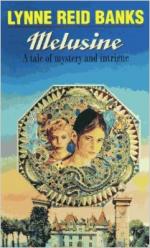|
This section contains 235 words (approx. 1 page at 300 words per page) |

|
Like Banks's The Indian in the Cupboard, Melusine belongs to the class of books generally referred to as "modern fantasy," of which there are numerous examples, including C. S. Lewis's The Lion, the Witch, and The Wardrobe (1950).
More particularly, Melusine belongs to that category of stories (many of them myths and folk tales) that have to do with "transformations"—the changing of people into monsters or animals and vice versa. A few of the best known such stories are Robert Louis Stevenson's Dr. Jekyll and Mr. Hyde, the familiar "Beauty and the Beast" (of which several films have been made), and the Grimm Brothers's "Rose Red and The Seven Swans." John Keats wrote a famous poem, "Lamia," about a young woman who is half serpent, and, although Mary Shelley's Frankenstein is not exactly a "transformation" story, it does depict a "monster" who, like Melusine and...
|
This section contains 235 words (approx. 1 page at 300 words per page) |

|




